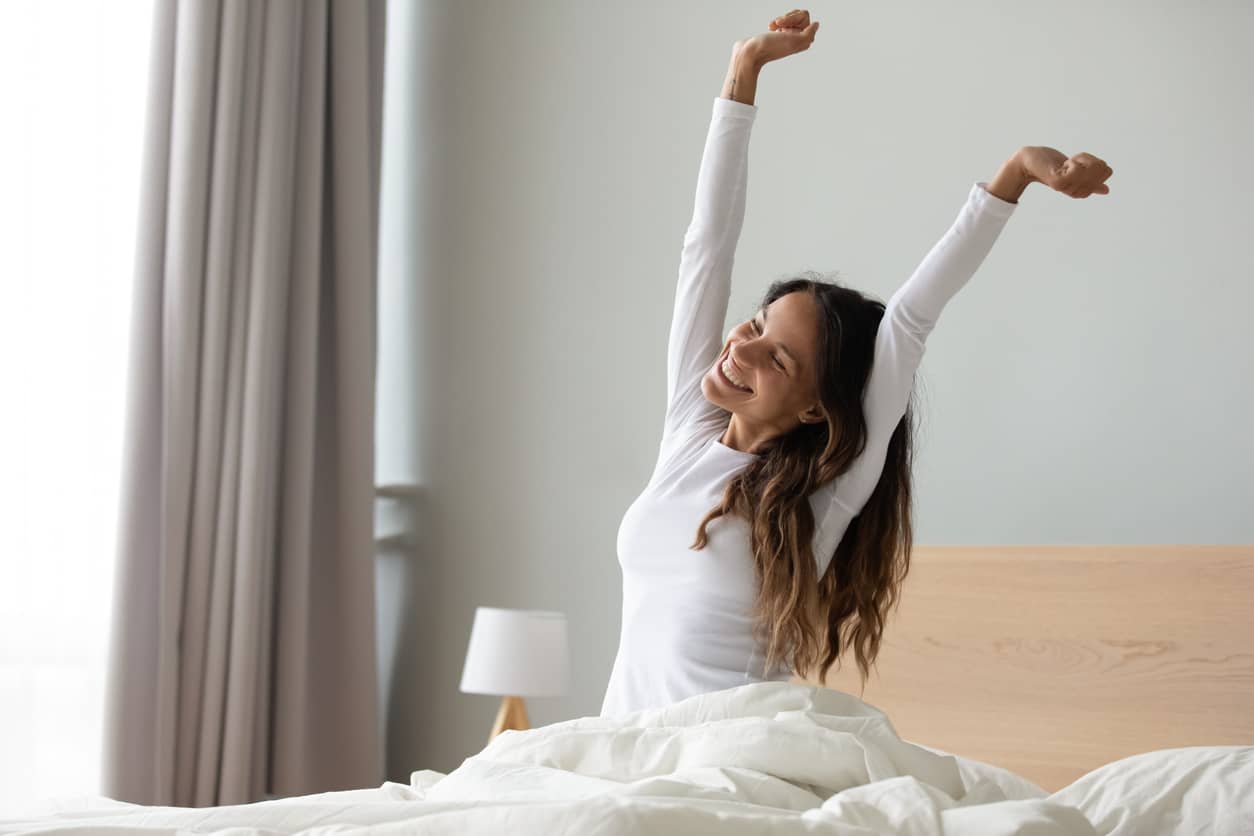Can’t get out of bed without feeling tired? Always need coffee to wake up early? Here are 6 tips to wake up refreshed, without caffeine or even an alarm!
Imagine waking up early in the morning, without needing even a drop of coffee! How about waking up naturally without an alarm, feeling refreshed and alive, rather than tired and groggy? Sounds like heaven, doesn’t it? It might sound too good to be true, but this is totally doable! To prove it: this long-time night owl (me) has been waking up at 6:30 AM, without an alarm, without caffeine, for the better part of a year! Check out my 6 tips below on how to wake up naturally and leave that sense of grogginess behind for good! (plus there’s a bonus tip at the end for starting your morning off right once you’re awake!)
How to Wake up Refreshed (Naturally!)
Let’s get into it!
1. Plan to complete a full sleep cycle just before waking up.
According to SleepFoundation.org, we repeatedly cycle through 4 stages during sleep:
- N1 – we begin to doze off. Brain and body activity starts to slow. It’s easy to wake up a person in N1 sleep, but it only lasts a few minutes before moving to stage 2.
- N2 – Brain activity slows down. N2 sleep can last 10-60 minutes, starting out on the shorter side and lengthening as the night passes.
- N3 – This is the deepest sleep stage. N3 sleep lasts 20-40 minutes and actually gets shorter as you sleep longer.
- REM – This sleep stage is most often associated with dreams since brain activity speeds back up dramatically. REM sleep will start out at just a few minutes, but by the end of the night could last an hour per cycle.
Each sleep cycle can last 70-120 minutes total, with later cycles lasting longer than earlier cycles.
It’s important to try and get through an entire sleep cycle before being woken up. According to Valley Sleep Center, if you’re awakened during REM sleep or N3 sleep rather than at the end of a complete cycle, you’re more likely to experience sleep inertia. This happens when you’re woken before your body is ready, causing an intense groggy sensation. If you wake up at the end of a sleep cycle, you’re much more likely to feel refreshed. (This is also why hitting the snooze button can make you feel more sleepy – you may start to move into another sleep cycle!)
Plan the number of hours of sleep you need to wake up at the end of a full cycle. (This could be slightly different from the number of hours you typically need to function.) You can use trial and error to determine this, or you can use one of the numerous sleep cycle apps available. These will monitor your sleep and can tell you how long you spend in any given stage. Once you know when you typically approach the end of a sleep cycle in the morning, you can plan bedtime accordingly. When you start waking up at the end of a full cycle, you’ll find you’re able to wake up on time even without an alarm!
2. Keep to a strict bedtime.
Once you’ve figured out approximately how much sleep you need daily, figure out an appropriate bedtime. When I say “bedtime,” I don’t mean the time you start getting ready for bed. I mean you’re in bed, your eyes are shut, and you’re actually dozing off into N1 sleep! If you’d rather not mess with figuring out your sleep cycles, just assume you’ll need 1 hour more sleep than you think you do, and set bedtime accordingly. Again, plan to actually be in bed and asleep at this time. Of course, this means you’ll need to start your bedtime routine early!
Be consistent! You may be tempted to stay up just a little bit longer sometimes, including weekends; but trust me, even staying up a half hour more can affect your sleep. Think about it like this: in order to have that perfect Monday morning when you wake up bright-eyed and bushy-tailed, ready to go, with no caffeine whatsoever, you need to give yourself a hard boundary at night. You get what you give!
3. Plan for a full hour of downtime before bed.
Who of us can engage in normal activities and then immediately fall asleep with a snap of the fingers? Not many (if any) – we typically need some downtime to let our bodies wind down before bed. Plan for a full hour to wind down and let your body get used to the idea of going to sleep. Again, keep your wind-down start time consistent, just like bedtime! You may be tempted to enjoy higher-energy activities a little bit longer, leaving less time to come back down. But trust me when I say, this will mess with you: during the times I do this, it makes it so much harder for me to fall asleep quickly. When you go to sleep easily, you’re more likely to get the full amount you need to wake up refreshed.
4. Perform your bathroom routine at the beginning of wind-down, not at bedtime.
Activities typically done during the bathroom routine may tend to re-awaken your body (i.e., face washing, night showering). So it’s a good idea to do these earlier rather than later, closer to bedtime. This way, you won’t accidentally re-invigorate your body by splashing water on your face right before bed. You also won’t have to worry about it when you’re feeling sleepy – you can just go right to bed!
(On a related note: it can also be a good idea to install dimmer switches in your bathroom. This way if you need to use the facilities before bed, or if you happen to get up during the night, you’re not jarred awake by the bright light. Honestly, I’d never heard of dimmer switches in a bathroom prior to living in my current home, but now I’ll never go back!)
5. Enjoy a tech-free and stimulus-free wind-down.
It’s well known that devices before bed is a major no-no. They emit blue light that messes with our body’s circadian rhythm, waking us back up when it’s time to start getting sleepy. So, an hour before bedtime/eyes closed, put away the phone and tablet. Turn off the TV, radio, and music. Turn off unnecessary lights, and dim the remaining ones; this will aid the production of melatonin in your body. Remove all visual and auditory stimuli, and enjoy the silence. (Ever tend to feel sleepy during the day, if it’s silent? Same thing applies here.) In the absence of stimuli, your body will naturally start to settle and turn off for the night.
Use this time to engage in some calming activities like yoga, meditation, or reading. Giving yourself a full hour will allow your mind and body to fully slow down and reconcile to upcoming sleep. Over time, your body will become accustomed to these activities as a signal to start shutting down for the night.
6. Use a gradual or progressive alarm in the morning.
Instead of using the typical alarm that jolts you out of bed, consider using a progressive alarm. This alarm will start out soft in volume and gradually get louder, waking you more naturally. If you can, choose a pleasant musical setting instead of a grating beep. Phone alarms generally have multiple options to choose from. If you’re using an iPhone, the alarm included in the Bedtime feature (separate from the Alarm feature) utilizes a gradual increase in volume. It also has different sounds from the main alarm function. (Personally, I love waking up to the Springtide sound – it’s like hearing light musical waves. Since switching to this alarm, it’s so much easier to wake up on the occasions I do need it!) During the winter, you can also utilize a progressive light alarm, which will increasingly glow like the sun, simulating sunrise.
Even if you don’t go to bed on time, a progressive sound or light alarm will still wake you in a much more pleasant fashion than a typical alarm clock. It wakes you gradually from slumber versus jarring you awake – so much nicer!
Bonus Tip! Plan a calm half-hour before starting your day.
When getting up in the morning, don’t try to be up-and-at-’em immediately upon waking. Let yourself ease into the day. Grab a cup of milk or water to re-hydrate your body, and just relax in the kitchen or living room for a bit. This way, you won’t feel rushed or stressed. When your body is ready, you can then start in on your busy day. Just knowing that you don’t have to get up and go as soon as you arise can be incredibly calming and help you start your day off happier. If you get up super quick and start rushing around (like an adrenaline high), it could actually make you tired again.
I usually get up at about 6:30, but don’t start moving around much till 7. I personally like to relax with a cup of milk; it tastes better to me than water first thing in the morning, plus milk can actually hydrate better than water.
Takeaway
You might think you’re doomed to always wake up tired, especially when you have to get up early normally. But if you follow these 6 tips, you can wake up naturally refreshed, ready to go, without coffee! Enjoy your newfound delightful morning!
You may also be interested in these!
Cover image photo credit: IStockPhoto.com/fizkes





Great tips, they really help!
The concept of waking up at the end of a sleep cycle is so interesting to me and makes complete sense. Gonna have to experiment with it!
Honestly, that’s the biggest one that helps me! If I’ve slept 8 hours, but I’m woken at the wrong time, I still feel like I need more sleep!
These are great tips! I’ve recently had a little trouble sleeping and could use some stricter bedtime rules, lol.
Love the bonus! I do love to start my day off relaxed 🙂
I would love to wake up feeling like I actually slept!
Love all the ideas, still love my coffee too
I LOVE MY COFFEE! But these are great alternative ideas!
Lol!!! Thanks!
What an interesting take on sleep. I will have to work on figuring out my sleep rhythyms.
Lots of great information here! Thanks for the reminder to do the bathroom routine earlier. Last night I was reading and got very sleepy, but when I went into the bathroom and washed my face, I woke right up. I then tossed and turned in bed for more than an hour. Ugh!
This all sounds wonderful. But as a full time shift worker, it would be completely impossible! Someday I guess!
I wish I had better sleep habits! What are some sleep cycle apps you’d recommend?
So sorry for the delayed response! I haven’t personally used an app or tracker to monitor my sleep cycles (I figured mine out via trial and error), but I know the wrist Fitbits have this ability. (I just can’t sleep with anything on my wrist at night.) I know there are also apps available that have gotten great reviews on Apple/Android. These include Sleep Watch (used with the Apple Watch), Sleep Time, Rise, ShutEye, Sleep Cycle, and others. I’d suggest doing a little research to see which might be the best fit for you. 🙂 I hope this helps!
Great tips!
These are great tips for starting the day refreshed and ready to go!
I must be doing something right because I always wake up in the morning well before my alarm goes off. Good suggestions.